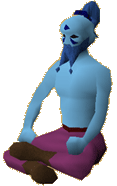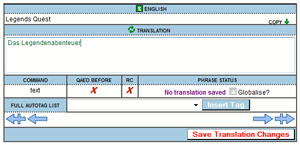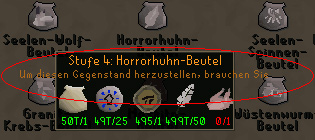Localisation: A Day in the Life
A Day in the Life
by Mod�Vero 12-Feb-2010
We�re a team of in-house translators and testers from far-away countries who�ve been lured to Cambridge with promises of fame and fortune.
The more observant amongst you might have noticed the little flags at the top of the start page of both RuneScape and FunOrb. Those lead you to the three language versions that are currently available: German, French and Brazilian-Portuguese.
Each language team consists of one team leader/translator, two translators and one localisation tester and Mod Annaw who is the head of our department. This is a day in our lives...
9-10am
The localisation testers usually start their day with a cup of coffee and a generous helping of bug reports from the localised websites. "We check every bug report that gets sent in by jumping into the game and trying to reproduce the error. That�s why it�s so important that you give us as much detail as possible in your bug report forms. Translation-related bugs we can fix right away (even though the change will only be visible after the next game update). Game-breaking issues will also be handled by the localisation testers immediately while all other non-localisation bug reports get forwarded to the English QA", explains Mod Toom, the French localisation tester.
10-11am
In the meantime, the translators work on translating the upcoming updates. This not only includes in-game text, but also newsposts, website text, forum posts, even some of the dev blogs. "We try to make the translated text at least as much fun to read as the English one. That means that we spend a lot of time localising the many puns, jokes and puzzles in RuneScape and FunOrb. If we can�t think of a good translation right away, we have a brainstorming meeting about it", explains Mod Talula, the French team leader.
Mod Heiko, the team leader of the German translation team, remembers: "The most difficult translation in RuneScape was in a quest called 'Spirits of the Elid', [spoiler alert] where the player thinks they need to collect 'souls' for the genie. Only later do they find out that the genie is actually looking for 'soles'. As those two words don�t sound alike in any of our languages, the wordplay didn�t work and we ended up re-writing big parts of the text."
12am-1pm
On an update day, this time can be quite a busy one. There might be some more sentences to translate which only popped up recently. Thankfully, we have a very clever translation system, which spots untranslated phrases, before they have a chance to go live, and flags them to us with a bright red warning sign.
The translation system has lots of other snazzy features - too many to list - but if you ask them nicely, the Web Systems team might write a blog about it. After all, they were the ones who developed it!
1-2pm
Lunch! Mittagessen! D�jeuner! Almo�o!
2-3pm
All translations are tested in WIP (work in progress) by the language testers, to make sure that the translated text fits the interfaces and makes sense. As a general rule, translated text is 20% longer than the English original, which is why we often struggle to make our text fit the interfaces (the interface for the summoning pouches was quite a challenge). Usually, the testers will first demand that the translators use shorter words. If the translators cannot mutilate the text enough to make it fit, the testers will work with the developers to make the interface wider or find another creative solution (mouseovers and symbolic language are big favourites!). "When the developers see me coming, I can see their hearts sinking, because they know they�ll have to rework some interface or a piece of code", says Mod Dagget, the German localisation tester. "On occasion, testers use little self-written helper programs to reproduce specific in-game contents more quickly. Once, I was testing some NPCs on the test server with Mod Claudio and had his test character bashed into the ground immediately by a freshly spawned Bork."
3-4pm
When time allows them to take a short break from translation, the translators usually browse the language forums to see what�s going on there. We will answer questions or collect the feedback on the latest update, which we then pass on to the content department. We also update the Jagex Twitter and Facebook. "Some people might not be aware of it, but we have Twitter and social networking pages for our language versions (Facebook for German and French, Orkut for Brazilian). We use them as an event diary, do little puzzles, upload photos and let the players submit their own screenshots. You should look us up sometime!" says Mod Giuly, the Brazilian lead translator.
4-5pm
Time for the team leaders of each language to attend the weekly RuneScape scheduling meeting! As translation is last in the production process, we often have to rush to get the translation done in time for the release. Therefore, it�s important for us to be up-to-date with how the projects are progressing, if all departments are managing to stick to their deadlines, and when the project will be available for us to translate. This is when Mod Annaw takes her axe out of her handbag...
5-6pm
At the end of the day, the translators will have translated 2000 words per person or proofread/edited about 4000 words per person. The localisation testers will have tested between 3000-4000 words in game. You might be thinking: "Why don�t they just use automatic translators - that would be much quicker!" Well, the machine translation tools still struggle with idiomatic sentences. Consider this sentence: "We see ourselves in the play!" Do you understand what it means? We don�t. It�s supposed to be the English translation for "Wir sehen uns im Spiel!" (We�ll see you in-game). Good for us - that means we�ll still have a job, at least for the next 10 years or so...:)
Thanks for reading!
To read this blog on the German forums, click here.
To read this blog on the French forums, click here.
To read this blog on the Portuguese forums, click here.









